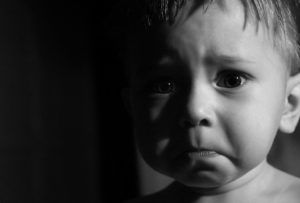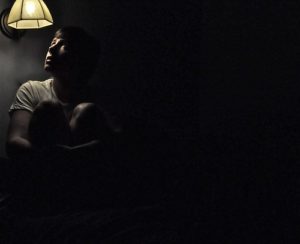Content
Fear is one of the basic human emotions that absolutely all people experience, regardless of gender, age and social status. In order to know how to cope with this unpleasant condition, it is important to understand what are the benefits and harms of fear for a person and how it can be used.

What is fear and how does it arise
Fear is a negatively colored emotion that arises in response to a security threat. This threat can exist both in the real world (here and now) and in the mind of a person when he imagines a possible outcome of events. Such a fear serves as a protective emotional reaction, the property of which - to warn the body against possible danger - is based on the instinct of self-preservation, which is most important for a person.
The benefit of fear is the activation of several types of reactions that help a person adapt to a dramatically changed environment. The main signs of such an emotion are wide-open eyes and a sharp freeze.
Sometimes fear is associated with courage: it is believed that courageous people automatically display the properties of fearlessness. However, this is not so: courage reflects the volitional aspect - the intention of a person to step over obstacles, to include in himself, if necessary, determination and confidence. Fear is associated with the emotional aspect: even the most courageous people tend to be afraid of something.
At the mental level, this causes anxiety, anxiety, sleep and mood disorders, and at the physiological level, this is accompanied by increased blood pressure, rapid pulse and breathing, profuse sweating, weakness, nausea, dry mouth, etc.

There are many reasons for the appearance of fear. In addition to situations where a person is directly confronted with danger, this fear can be rooted in past experiences, usually in early childhood, that affected the psyche with the harm of a traumatic experience. Its source could be psychological or physical abuse of a child, various beliefs and prejudices of parents, which were deposited in the depths of the child's subconscious.
The esoteric version is the search for the causes of fear in the traumatic events that occurred in a person's "past life", and therefore regressive hypnosis is used to neutralize it.
In addition, any stressful situation in the past, which caused a feeling of severe discomfort and anxiety, can later be carried over to similar events and provoke the same emotional reactions.
In everyday life, fear is sometimes called a phobia. However, a phobia represents a persistent painful emotional response to a specific situation that leads a person to a feeling of helplessness and complete disorientation. While fear is normally not sustainable and serves to mobilize the body to further prevent danger.
Causes of fear
The most common causes of protective emotion include:
- Attachment to objects of the outside world, dependence on them. We tend to stick to things that are meaningful to us, people, life circumstances. Over time, this attachment can develop into addiction, against the background of which the fear of loss or loss of a vital object begins to develop.

- Lack of faith in something, inability to refer oneself to a single system. The inability of a person to recognize himself as a part of something whole, as a result, forms a feeling of inner fear. A feeling of self-doubt, in the future, doom, helplessness and fear of the unknown is born in the subconscious. And vice versa, belonging to a certain system gives rise to faith and the feeling of security and peace associated with it.
- Low assessment of one's own strengths and capabilities, a feeling of incompetence in front of others. This serves as the basis for the emergence of a personality inferiority complex, fear of being rejected by society, and cause disapproval of others. A person from a subject that influences life begins to identify himself with an object that is in the full power of significant persons who can eventually destroy it. Against this background, the fear of death arises, which in the future can become the basis for the development of fear of disability, aging, etc. Examples of manifestation are fears of loss of a profession, loss of social status.
Types of fear
Among the various classifications of fear, one can single out the modern system of V. Shcherbatykh, according to which this emotion works at three basic levels of human existence.
Biological
At the biological level, people tend to experience anxiety and fear of phenomena that threaten health and life, including the elements and natural disasters, poisonous animals, etc. Such fears are justified by real conditions of danger.
Social
Social fears often stem from biological fears (for example, a child's fear of dentists can later translate into lifelong avoidance of the dentist's chair). Social in nature can be:
- fear of not pleasing influential persons (director at work, teacher, etc.);
- fear of failure;
- avoiding responsibility for something (in the family or in a team);
- fear of loneliness, lack of attention and care of others;
- concern about negative assessment or condemnation from society.
Existential fear
Internal fears, or existential ones, tend to arise in the deep structures of the brain. Usually they are not recognized by the person himself, and the object to which the fear is directed can only be indicated by general features:
- fear of oneself;
- fear of wasting time, as well as an uncertain future and death;
- anxiety before something unknown and unidentified (mysteries of the world).
Representatives of existentialism believe that the benefit of such deep fears is in their ability to free a person from everything that is insignificant and bring to the highest level the connection with his essence (existence), which opens the meaning of existence.
Childhood fears

Natural emotional mechanisms of protection from danger in the form of fears in children are normal, can turn into neurotic - with improper upbringing (for example, with the help of punishment). Among them are:
Obsessive fears
They arise in the child's subconscious when experiencing situations that cause a panic reaction in the child. Examples would be:
- fear of heights (falling down);
- fear of doctors (pain);
- fear of open areas or a huge crowd of people (for a child this means the danger of losing their parents).
Delusional fears
They may indicate serious problems in the child's psyche. Finding the cause of such fears and explaining them is rather difficult.For example, a child's fear of playing with a certain toy or putting on a particular piece of clothing.
If the parent has discovered such fear, you need to try to find out the objective reason for such fear. Perhaps, holding a toy, the baby fell or hit - and later this particular object will be associated with danger.
Fantastic fears
These most common fears are due to the usual life situation, but over time they can completely take over the thoughts and subconscious of the child. An example would be the fear of the dark, which can soon develop into a fear of the "big and terrible monsters" living in it.
Age fears
It is also customary to highlight the so-called age-related fears that arise and disappear at a certain age and are considered the norm in child development:
|
0 - 6 months |
fears of sharp loud sounds, movements, flashes of light |
|
7 - 12 months |
fear of loud sounds; strangers, changing clothes, changing surroundings, lighting, temperature |
|
1 - 2 years |
fear of separation from parent, bad dreams, strangers |
|
2 - 3 years |
fear of losing parents, changes in the environment and location of familiar things, natural elements, unfamiliar children of the same age, unfamiliar objects - household appliances, etc. |
|
35 years |
anxiety associated with death (understanding that life is not eternal), natural disasters, pain |
|
6 - 7 years old |
fear of fairy-tale heroes (witches, sorcerers, monsters and ghosts), loneliness, physical violence, losing yourself or losing your parents, |
|
7-8 years old |
fear of dark places (basements, closets), natural accidents, disasters, lack of love from others (friends, parents, teachers at school), rejection by "significant others" |
|
8 - 9 years old |
fear of defeat in games, low academic performance, conviction of deception, quarrels with parents |
|
9 - 11 years old |
fear of certain animals, heights, diseases that pose a threat to people (alcoholics, bandits, hooligans) |
|
11 - 13 years old |
concerns about others' rejection of their appearance, illness and death, sexual and physical abuse, criticism and remarks from elders |

Fears of a child, left without attention of parents, in the future can lead to negative consequences and harm his fate. In the future, he may encounter problems of adaptation in the team, and all this may also result in the harm of the appearance of neuroses and serious complexes. Therefore, it is especially important to pay attention in time to the appearance of this or that fear in the child and try to help him by seeking help from a specialist.
How are fears useful?
For a person, fear initially performs a useful function of protection from a possible threat to his existence. There are several examples of the benefits of this or that fear:
Fear of pain
Fear of pain (or algophobia) is beneficial when it prompts a person to think better about the consequences of their actions.
The fear of physical pain can save human life, acting as a "brake signal" in front of a possible danger, which includes the release of adrenaline into the bloodstream and, as a result, the active mobilization of all the main resources of the body, which increases its physical endurance. Many cases have been described in the world when, in a state of fear, people performed actions beyond their usual capabilities.

Fear of water, fire and animals
Fear associated with water, or hydrophobia, in a poorly swimming person is absolutely normal, the benefit of which is to preserve his life. Likewise, fear of fire (pyrophobia) and other elements, as well as animal attacks, are usually based on specific negative experiences.However, by origin, they are the most ancient, biological fears: the scales tilt towards benefit or harm, depending on the presence of a neurotic component, which outside the norm transfers an emotional alarm signal from a constructive task of self-preservation to a destructive level of mental destruction.
Fear of the dark
Studies on the benefits and harms of fear of the dark have shown that it tends to manifest itself in more than 90% of people: the difference is only in the degree of its severity. Having been born in early childhood, it can fix and manifest itself regularly in the consciousness of an adult.
The benefit of the fear of the dark, in addition to its direct protective function, is indirectly related to creativity, since emotion tends to actively manifest itself in people with a rich imagination. A useful energy resource of this fear can be used to develop a person's creative skills.
Fear of being alone
The fear of loneliness, or, in a painful manifestation, monophobia, is harmful to social isolation, but normally the benefits of such fear are also hidden in the potential of the person himself. Psychological studies have shown that monophobes are often open and friendly people with a fairly large circle of friends and acquaintances. They tend to value friendship and relationships highly, but they are afraid of losing it all.
Fear of death
This is a natural feeling for everyone, which, however, at the level of thanatophobia, deprives a person of strength. Mastering the energy potential behind this fear opens the way to a transcendental level of revaluation of one's life. Life and death questions help people to build their moral guidelines and principles. For example, the fear of sudden death contributes to a person's awareness of the value of every moment lived and motivates him to enjoy life in all its manifestations.
The useful effect of the technique of getting rid of the obsession with the idea of death is based on this: “die beforehand”: to imagine that the inevitable has already happened. And to think about what most of all causes regret in such a fatal version of events: an unfinished business, a word unsaid in time, an unfulfilled desire. Anything that such an analysis reveals should be put into practice.

Fear of heights
The fear of heights brings undoubted benefits to human safety, protecting him, for example, from the risks of such popular entertainment now as "bungee jumping", bungee jumping and rope jumping. In a healthy manifestation, fear will force a person to evaluate their strength and possible harm from the adverse effects of such adrenaline stimulants. However, if a person experiences panic, even looking out of the window of a multi-storey building, this will be a sign of the presence of acrophobia, which needs long-term therapy.
The same is the case with similar fears: for example, the fear of a closed or open space, which normally have undoubted benefits for a person's life, and in the form of an irrational manifestation of such emotions (claustrophobia and agoraphobia, respectively) can harm a serious mental disorder.
The harm of fear
However, in addition to the benefits for the preservation of human life and the survival of the species as a whole, fear can also pose a serious danger to the normal existence of an individual.
The most obvious harm of fear manifests itself in blocking the ability to think adequately in a situation of danger. For example, standing in front of an aggressive beast, there is a high probability of experiencing numbness or rushing to run, thereby further complicating the situation.
Constant fear, turning into a phobia, tends to inhibit the normal functioning of the nervous system, which threatens the harm of depressive conditions.
The harm of some types of fear is especially dangerous for a person: for example, the fear of a confined space is often hereditary in nature, and the result of the resulting panic states can be neuroses, depression - to the likelihood of the patient being injured or, in severe cases, suicide.

This is actively reflected in our consciousness: the fear of the dark can turn a person into a real paranoid, hemophobia (fear of blood) provokes emotional shock at each collision of a person with the sight of blood, and the fear of the dark (nytophobia, or achluophobia) makes its wearer sleep with the lamp on.
Fear of something worsens the quality of a person's life, placing his consciousness in a certain framework. For example, a person who is afraid of water often cannot learn to swim even with an instructor. For this reason, the power of fear provokes in the minds of complexes, indecision.
Fear is able to take away the life force from the owner, focusing the concentration of attention and obsessive thoughts around the phobia object.
In general, the benefits and harms of any fear can be presented in the form of a table:
|
|
Benefit |
Harm |
|
Fear of water, fire, animals |
The risk of drowning, being burned or bitten by a predatory animal is significantly reduced |
Such fears tend to easily turn into neuroses, which causes great harm to a person's mental health. |
|
Fear of the dark |
May indicate a person's creativity |
Night time or being in a dark place cause panic attacks |
|
Fear of death |
Human awareness of the value of life |
Obsessive thoughts about your early death |
|
Fear of pain |
Prevents a person from rash or extreme actions |
A significant decrease in the quality of human life; may lead to a number of other fears, such as visiting doctors |
How to deal with fears within yourself

Each fear contains signals useful for a person, however, in a distorted form, this emotion only takes energy and causes serious harm to the psyche. Coping with phobias is a rather difficult task that only a specialist can solve, however, with a competent study of anxiety states, a space for further development opens up.
Basic techniques will be helpful in this.
Compare your fear with others
The secret is simple: each of us tends to exaggerate or dramatize problems. When comparing his fear with others, more serious, a person often comes to the realization that his "tragedy" is not as terrible as it seems, and the fear gradually leaves his consciousness.
The fear came true
Even in the most difficult situation, it is necessary to remain calm and remove the significance of fear. This can be done like the "die beforehand" technique: imagining the worst that can happen: the embodiment of your fear in reality. Then you need to concentrate on the internal energy and try to look constructively at the solution to the problem.
Down with the past
Oddly enough, most "phobias" are based on past experiences of dealing with situations that led to some kind of failure. Therefore, it is most important to find the cause of fear in your past and not be afraid to try to go through similar events in the future.
Live here and now
Such advice will be especially useful for people who tend to scare themselves with a terrible and unpredictable future, thereby depriving them of energy and strength for real life. The best solution is to try to live in the moment, removing the significance from the assumptions: until it manifests itself in reality, there is no reason to worry.
Conclusion
As with any phenomenon in our life, the benefits and harms of fear are two sides of the same coin. All fears normally carry the useful properties of the instinct of self-preservation, but when the significance is fixed, they can make a person their victim. The developed skill of managing so-called phobias is of direct benefit as a motivation for personality development.

